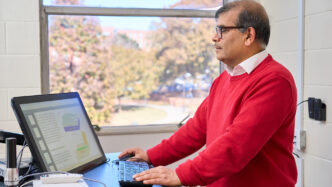CLEMSON, South Carolina – Three College of Science undergraduates are recipients of the 2020 Barry M. Goldwater Scholarships, the premier and highly competitive national award for students who have the potential to advance research in mathematics, natural sciences and engineering.
The selection of physics junior Paul Marston Copeland, biological sciences junior Shaoni Dasgupta, and mathematics sophomore Carson Wood brings Clemson’s total number of Goldwater Scholars to 50.
This marked the second year in a row that the College of Science produced three recipients. In 2019, the winners were Laura McCann, a chemistry major; Erin Mihealsick, a genetics and biochemistry major; and Benjamin Slimmer, a physics major.
In all, 396 students nationwide received scholarships this year. They were selected from a pool of more than 5,000 candidates, which resulted in 1,350 nominations from 461 schools. Each university could only nominate up to four students.
“Clemson’s results are the best in South Carolina, and only two other ACC schools had a comparable result this year,” said Robyn Curtis, director of Clemson’s Major Fellowships office. “We continue to lead the ACC in Goldwater Scholars since 2006.”
“Our faculty are tackling some of society’s greatest scientific challenges while preparing the next generation of leading scientists, like Marston, Shaoni, and Carson,” said Cynthia Y. Young, dean of the College of Science. “I congratulate these three outstanding students and their advisors, Drs. Marler, Smith, and Poznanovik, for this national recognition of scientific excellence and thank them for helping elevate Clemson’s academic prominence.”
Marston Copeland
Copeland, who plans to pursue a Ph.D. in theoretical nuclear physics, worked for a year with Clemson assistant professor Joan Marler on experimental atomic physics projects.

Copeland helped develop a 3D printed ion deflector as a possible replacement for more expensive metal devices in ion optic experiments. He presented the results of this research at an American Physical Society regional meeting and was co-author on a journal paper.
He also helped Marler’s group build a low-cost apparatus to measure the emission spectra of different heavy metals, which is important for understanding which elements are involved in neutron star explosions.
“What makes Marston truly unique is that he is equally comfortable doing theory work and working hands-on in the lab,” Marler said. “Our lab has benefited tremendously from his contributions on both fronts.”
Since the summer of 2019, Copeland has been working with researchers at Thomas Jefferson National Accelerator Facility (Jefferson Lab) in Newport News, Virginia, learning the fundamentals of relativistic chiral effective field theories. In this theoretical framework, he researches particle self-energies caused by quantum fluctuations, and how self-energies affect the properties of particles.
As a result of this work, Copeland submitted a paper to the American Journal of Undergraduate Research as the first author, and he presented his results at one national and two regional American Physical Society meetings.
According to Copeland, persistence is a virtue because his Goldwater Scholarship application fell short during his sophomore year, but he continued working hard in the research lab and in the classroom.
“It’s incredible to win such a prestigious award and see all my hard work pay off,” said Copeland, a resident of Simpsonville, S.C. “I’m really thankful for all my mentors, family members and peers who helped me along the way. I’m hoping this scholarship will open a lot of doors and help me be more competitive when I apply to graduate schools next year.”
In addition to research, Copeland serves as the physics representative on the College of Science student advisory board, and he helped organize physics demos on the library bridge last year during Clemson Sci-Week. He also served on a Research Experience for Undergraduates (REU) panel, encouraging his peers to apply for REU summer internships like the one he received at Jefferson Lab.
Shaoni Dasgupta

Since her sophomore year, Dasgupta has been conducting research in the lab of genetics and biochemistry professor Kerry Smith on Cryptococcus neoformans, the fungus that can cause fungal meningitis in individuals with compromised immune systems.
Scientists have identified three possible gene sequences for a critical enzyme, carnitine acetyltransferase, that is involved in acetate metabolism. Dasgupta is using CRISPR-Cas9 gene editing techniques to eliminate the gene encoding the third form of the enzyme. Examining the gene knockouts of the enzyme will aid in understanding the pathogenesis of C. neoformans, as carbon metabolism, particularly acetate metabolism, is essential in the virulence of the fungus.
She presented a poster explaining her research progress at a national conference last fall.
“Shaoni has an outstanding scientific curiosity and the patience and ability to problem solve,” said Kerry Smith, director of the Eukaryotic Pathogens Innovation Center. “I am impressed with how hard working and meticulous she is as a researcher.”
In the summer of 2018, Dasgupta worked as an intern with a professor at the Medical University of South Carolina (MUSC) in her home town of Charleston on a project examining the role of collagen deposition and inflammation in diastolic heart failure.
After she graduates from Clemson, Dasgupta’s ultimate goal is to earn M.D. and Ph.D. degrees and conduct biomedical research with an emphasis on gene repair and editing methodology.
“This scholarship is a great honor,” said Dasgupta, who earned a Beckman Scholar honor in 2019. “I’ve been interested in research since high school, so this award is a testament to all the hard work I’ve put in over the years. I’m grateful to Professor Smith and my other Clemson professors as well as Robyn Curtis, who all helped me reach the level I’ve attained today. It’s been a great privilege working with them.”
Outside of her research interests, Dasgupta has been active with the Clemson Peer Assisted Learning (PAL) program, which is run by the campus Academic Success Center. As a leader and mentor, she helps her fellow students develop strategies to master organic chemistry courses, so they can become more confident, independent learners.
Carson Wood

A resident of Lynchburg, Virginia, Carson Wood came to Clemson because of the opportunities for undergraduate research. After he graduates, he will pursue a Ph.D. in mathematics in either combinatorics or mathematical modeling at a major research university.
A member of the Calhoun Honors College, Wood worked in the lab of computer science professor Brygg Ullmer the summer before his freshman year, developing news ways to display and interact with data through the EUREKA! program. He continued on the project during the entire academic year.
Last summer, he conducted research on number theory at Auburn University through the National Science Foundation Research Experience for Undergraduates program. This work resulted in three peer-reviewed journal papers.
He is currently working with Clemson mathematics associate professor Svetlana Poznanovik on improving parameters for the prediction of RNA structure.
“Carson has had some great ideas for speeding up the algorithm we are developing to analyze RNA folding and has worked hard to turn those ideas into reality,” said Poznanovik, who has enjoyed having him work in her lab. “His work has helped our project a lot, and I can’t wait to hear about what he does in the future.”
This summer, Wood will work on financial modeling projects as an intern with Susquehanna International Group LLP in Philadelphia.
“Winning this award is validating for me and shows I can succeed in research even though I’m younger,” said Wood, who is only 18. “It’s also kind of cool to bring this award back to Clemson because the Office of Major Fellowships has helped me out a lot.”
Outside of the research lab, Wood is an elected member of Clemson’s Undergraduate Student Senate, serving as chair of the academic affairs committee. In March, he helped draft the new pass-fail grading option for the spring semester as Clemson students have had to adjust to online coursework due to the COVID-19 health crisis.
In addition, he’s the mathematical sciences representative on the College of Science Student Advisory Board, founder of the Late-Night Board Games Club on campus, and an ambassador/tour guide with the Clemson Calhoun Honors College.
###
Students interested in applying for the Goldwater Scholarship, as well as other nationally competitive awards, should contact the Office of Major Fellowships at 864-656-9704 or fellowships@clemson.edu.
About the Goldwater Scholarships
The Barry M. Goldwater Scholarship and Excellence in Education Program was established by Congress in 1986 to honor Goldwater, who served 30 years in the U.S. Senate. The program encourages the continued development of highly qualified students in the United States who are studying science, mathematics, or engineering and who intend to pursue doctorates. Recipients are awarded scholarships of $7,500 for tuition, fees, books or room and board.







